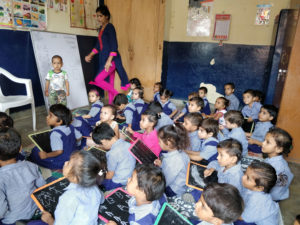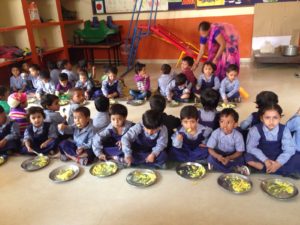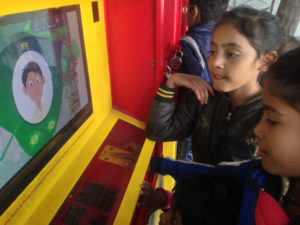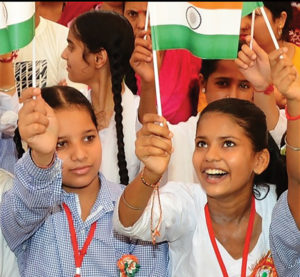From Cradle to Career
Through mobile learning buses, interactive kiosks, and the Educate a Child initiative – Children’s Hope is working to ensure each underserved child in India is better educated and equipped to rise out of poverty…
Crèches: CH supports small day care centers and preschools that help develop social skills and motivate young children to enter school when they are of age. The children learn the gross motor skills, play games, sing rhymes, learn numbers, colors, shapes etc.
Formal & Non-Formal Education: For many children in India, the fees associated with going to school, uniforms, shoes, and books can be prohibitively expensive. CH works to remove some of these barriers by taking children from streets into classrooms and transitioning them into public schools.
Higher Education Scholarships : To help bright motivated children realize their dreams to pursue higher studies, CH provides Scholarships supported by individuals and organizations.
Remedial Classes : There are a large number of older children who drop out due to many reasons. To stem this dropout rate, CH supports Remedial Classes that provide academic teaching, support, and the encouragement they often lack at home. Extra tutoring in subjects like reading, Maths, Science, English, and Computers improve students’ prospects in school and make it more likely for them to get back into mainstream.
CH PROJECTS
CHAHAK: Children’s Hope Academy of Harmony And Knowledge, Delhi
Preschool, Remedial & Vocational Centre
Bhartiya Shiksha Smiti
With the belief “Every Child Counts”, CH has taken another initiative to provide quality early care and education for the young ones. After a thorough survey of the Vikaspuri Camps of rickshaw pullers and daily wagers, CH realized that since there is no kindergarten in neighboring government schools, the young children aimlessly loaf around unattended while their parents go to work. On admissions into government schools (if it happens), around the age of six plus, children find it extremely difficult to adjust and cope with the basics of reading and writing.
This CHAHAK centre, started in April 2019, is guiding and facilitating the 3-6 year olds in preparing them for admissions into regular schools. CH also is motivating their families towards the importance of education, health and hygiene. Health being an integral part of our life today, CH is keeping a special focus on the health and hence has organised health and dental camps.
In such communities where the parents are not educated, they do not send their kids to school when they are young. Non Formal Education is an important which caters to the non-school going children who are prepared to be mainstreamed into the formal school systems. These children who have never been to school or dropped out of school due to various reasons like migration, lack of awareness among parents, poverty etc. These kids are prepared to be mainstreamed into formal schools by providing them non formal education according to their age and the suitable class.
In the second half of the day there are remedial classes for the students going to regular government schools. They are coached and aided in their studies with special emphasis on spoken English. Alongside, a computer vocational course is made available, where the children of the community can learn computer skills, play educational games and browse the net for any references related to their studies.
Click here to know more about CHAHAK
SCHOLARSHIPS
CH helps motivated children live their dreams of getting educated. CH provides Scholarships to these children, supported by individuals and organizations.
Other projects we had supported
Hamdard Balwadi
Project was implemented by Servant’s of the People Society, Delhi branch
The project was an initiative to provide a quality early care and education to the young ones. Children's Hope supported two such Balwadis located in Samgam Vihar and Durga Vihar. Approximately 150 children were groomed each year for getting into big schools and the mainstream of education. The children benefited from this jumpstart in their lives by the academic, nutritional and medical facilities provided to them.
Due to covid, the balwadis were non operational.
Hole-in-the-wall Education
Project implemented by NIIT Foundation
Located in the community, these computers were easily available to the children. These provided the windows to the outside world for the children! There were a total of two e-learning computer stations, where about 70-80 children, on a daily basis, accessed the educational content in a self paced mode and were able to learn and retain the concepts ranging from subjects like Maths, Science, English, EVS, Educational Games, Edutainment, Life Skills etc.
Senior Students are able to do their research work and browse around for more information. Now, there are regular computer classes for the community.
CHI Programs monitored and evaluated by CH
CHILDREN'S HOPE INDIA GIRLS ACADEMY (CHIGA), Bhopal
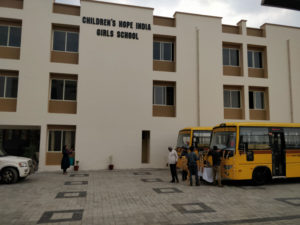
Project in partnership with Jeev Sewa Sansthan and implemented by Laxmidevi Vikyomal Shroff School & Prerna Kiran Public School
The school inaugurated on 5th March'2018 is a game-changer for girls from Gandhinagar, tribal areas and surrounding villages. 800 young girls (from standard VI to XII) will be provided an English medium education with State Board affiliation at affordable fees.
The school has 16 large classrooms, a library, a Closed Circuit TV system for the campus, a well-equipped computer lab, physics, chemistry and biology labs, a recreation room for sports and extra-curricular activities, a seminary hall for internal growth, a playground for physical activities; and a large assembly hall.
Please click here to know more about Educate a Child program.
CHI-UJAS Asha Kendra, Jodhpur
Project implemented by Universal Just Action Society, Jodhpur
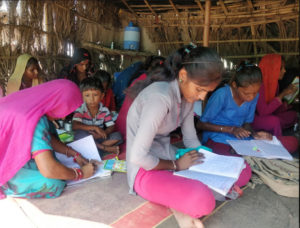
This community of hardworking migrants has been staying in the outskirts of Jodhpur where there is a shortage of basic facilities, with no schools. The children were losing their precious years. A few walked close to 5 km from their village to the nearest government school. But they too faced tremendous challenges due to language.
CHI, along with UJAS started a school where the children are coached and the young children who are unable to walk that far to the school are taught through Non Formal Education (NFE). Even women who have not studied earlier attend morning NFE School.
The community encourages their children to study. So the basic
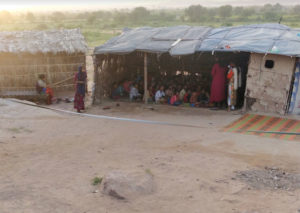
problem of educating parents about sending their children to school is not there and thus we have a good strength of approximately 70 children in the morning (with 40 in balwadi and 30 NFE) and about 90 in the evening for remedial.
With the presence of CHI-UJAS school in a very short period many children have started performing well in government schools and now are able to cope up with all subjects which are taught in Hindi. The others who have had a gap of 3 to 4 years (since there was no school in the community) are now studying through NFE (Non Formal Education) and will soon get admissions in the schools.
CHI PRAYAS, New Delhi
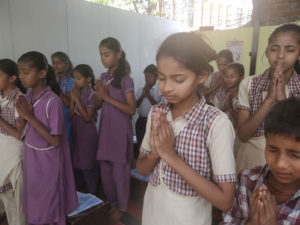
Project implemented by Prayas
A community based initiative since 2004, this project is Children’s Hope vision in action! After demolition of Kathputli colony in 2017, the CHI-Prayas school has moved successfully to Anand Parbat, supporting 400 children. The socio-economic status of the people living here is far below the poverty line. Kathputli was believed to have the largest single concentration of traditional street artists in the world.
The services at these centers include:
- Education: preschools, creches, tutoring, alternative education, remedial courses, adult education
- Remedial classes: In the evening there are regular remedial classes for classes 1-10. Children from the community attend these after school to get support in their studies.
- Community Initiatives: computer training, women’s self-help groups, micro- finance, vocational skills training, counselling (including adolescent services)
- Awareness Programs: sanitation, nutrition, Tuberculosis and HIV/AIDS, family planning, pension and governmental financing
- And more: crèches for infants, a library to foster learning, sports activities, educational trips, home visits, health check-ups, self-defence classes and nutritious meals.
CHI SBT SCHOOL, New Delhi
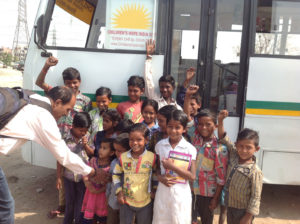
Project implemented by Salaam Baalak Trust
This project started in 2015 as the Mobile School with the aim is to link the underprivileged children to formal government schooling. The remote marginalized communities, in the outskirts of North-East Delhi, had the Mobile School Bus visiting 3 centres in a day (Shastri Park, Usmanpur Gaon and Seelampur). At each of these spots, 2 hour classes were conducted where the children not only learn from the books but also through discussions, games, activities and awareness movies.
The mobile bus was equipped with age appropriate learning materials spreading awareness and educating more than 200 children per session.
Now looking at the need and the increasing strength, This project started a centre at slum of Seelampur supporting all those and more students from the same community. Mornings there are ECE classes for the young ones followed by tuition and remedial support for the school going students.
The team of skilled teachers also help inculcate moral values, basic etiquettes and good habits pertaining to sanitation and hygiene among the children. Children learn and retain the concepts ranging from subjects like Maths, Science, English, EVS, Educational Games, Edutainment, Life Skills etc.
EKALAVYA SCHOOL, Hyderabad & Bangalore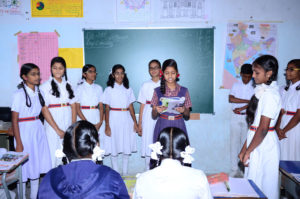
Project implemented by Kasturi Trust, Bangalore
CHI ‘s first Fully Accredited School is located in the slum area of Hyderabad where most of the residents are migrants from rural Telangana belonging to SC, ST & BC communities. 59.2% of our students come from Backward castes, 28.5% from Scheduled Tribes, 8.8% from Scheduled castes and only 3.5% from Open category. Majority of the parents are daily wage laborers or auto drivers.
Highlights of both the Hyderabad schools
| Education | Schools provides Education from Grades I to X to underprivileged children . |
| Mid-day meal | A nutritious lunch is served daily by the Akshaya Patra Foundation. |
| Teacher Training | A training session is organized on regular basis with senior facilitators from ‘Kendriya Vidyalaya’, Hyderabad |
| Health camps | Health camps are conducted throughout the academic year to monitor the health of students and keep the parents informed. |
| Special project interventions | Meghadoota (Online tutoring), Pygmalion (Spoken English) and Compukids (Computers) strengthen the academics interventions. And a special attention is given to the physical activities. The students regularly participate in sports events and have regular yoga classes.
Meditation workshops are held to help teachers and students to increase focus, sharpen concentration and perform better |
JAGATI SCHOOL, Jammu
Project implemented by Sharika Trust, in partnership with the Government of Jammu & Kashmir
CHI along with The Sharika Trust has entered into a partnership with the Govt. of Jammu and Kashmir to revamp a primary school with an initiative to add a nursery class. Hence enrolment and attendance has plummeted. The school building along with electricity and plumbing is being restored, as well as additional facilities such as playgrounds, computer room and a library are being added on.
EK KARKE EK SCHOOL, Mumbai
Project implemented by One! International
In the Nallasopara area, CHI offers school where children are taught in Steps, that range from Step 1 to Step 9. The pre-school / crèches are taught play skills, pre-learning concepts, oral English and Hindi, hand-eye coordination and more. Without this programme, many of our older girls would not be able to attend school. We also give tutoring to students studying for their board exams (Grade 10 and 12) outside of Ek Karke Ek School. For those not attending other schools, we run a full Grade 10 and 12 program and they write exams through NIOS (The National Institute of Open Schools).
CHI Hope Foundation Nursery & Primary School, Bhuj
The goal of this program is to provide education in this impoverished community. The K-8 school incorporates intuitive learning software, field trips, extracurricular activities, festival and holiday celebrations into the curriculum. Students also receive health and hygiene support, as well as nutrition. The school serves approximately 426 children (ages 3-14 years) and their families.
